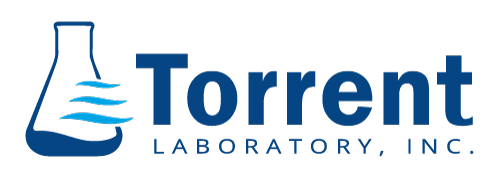Forever Chemicals: A Growing Threat – Solutions| Torrent Laboratory
Today, almost every American, including newborn babies, have “forever chemicals” — per- and polyfluoroalkyl substances, or PFAS — in their blood. These chemicals, which are resistant to friction, heat and degradation, have gained significant attention in recent years due to their widespread presence in the environment, long-lasting nature and the potential health risks they pose.
PFAS are a group of man-made toxic chemicals used for decades in a variety of products — nonstick cookware, food packaging, water-resistant fabric, firefighting foam, chrome plating and more — due to their water- and oil-resistant properties. They also are in the food we eat, the water we drink and the air we breathe. A study published recently revealed that these chemicals contaminate more than half the tap water in the U.S. The potential adverse PFAS health effects have prompted regulatory agencies like the U.S. Environmental Protection Agency (EPA) to take action.
Regulation of PFAS
Recognizing the potential dangers of PFAS, the EPA is working to address these substances through a combination of regulations, guidelines and research. One significant step was the issuance of a lifetime health advisory for two of the most studied PFAS compounds, perfluorooctanoic acid (PFOA) and perfluorooctane sulfonate (PFOS), which recommends a significant low level of these chemicals in drinking water, with some states such as California recommending 50 parts per trillion in drinking water. The EPA’s 2023 proposal recommends bringing it down to 8 parts per trillion.
The EPA is also working to designate PFOA and PFOS as hazardous substances under the Comprehensive Environmental Response, Compensation, and Liability Act (CERCLA), also known as the Superfund law, which would establish PFAS cleanup standards and hold liable those responsible for PFAS contamination.
Additionally, the EPA initiated actions to regulate PFAS discharges into the environment through the Clean Water Act, addressing potential sources of contamination from industrial discharges and wastewater treatment plants, and expanded monitoring and reporting requirements for PFAS in public water systems, enhancing data collection to understand the extent of PFAS contamination better.
Under its PFAS Strategic Roadmap, the EPA has been issuing test orders as a part of its National Testing Strategy as it recognizes that testing is an important first step towards identifying the extent of contamination.
The Importance of Testing for PFAS Contamination
Being at the forefront of PFAS testing, Torrent Lab recognizes its critical role in bringing change. Prolonged exposure to PFAS is linked to various health issues, including developmental effects, liver damage, immune system suppression and an increased risk of certain cancers. By conducting comprehensive testing and delivering accurate data, we can:
- Protect public health by ensuring that the water sources are safe.
- Preserve our environment by identifying PFAS contamination that allows for effective strategies to mitigate its impact on ecosystems and wildlife.
- Help communities and industries make informed decisions on corrective measures.
- Empower regulators to create policies and enforce PFAS regulations.
Tackling the PFAS Threat
Addressing the PFAS challenge will require government agencies, industries and communities to work together. PFAS contamination needs to be restricted before it gets out of control and does irreparable damage to human life and the environment.
- Rigorous Regulations and Standards: The EPA and other regulatory bodies should continue to establish and enforce stringent PFAS regulations and standards for these chemicals found in drinking water, air, soil and consumer products. By setting limits on allowable PFAS concentrations, we can reduce exposure risks.
- Research and Innovation: Continued research into the PFAS health effects and the development of safer alternatives is crucial. This can lead to the creation of new materials that provide the same benefits without the associated risks.
- Remediation and Cleanup: Remediation technologies need to be developed and implemented for current PFAS cleanup efforts. This includes soil and water treatment methods that effectively remove or break down PFAS compounds.
- Public Awareness and Education: Raising awareness about PFAS contamination and its potential health effects is essential. Educating communities, industries and policymakers about proper disposal practices and the use of PFAS-free alternatives can help prevent further contamination.
The regulation, testing and mitigation of PFAS contamination require a collective effort. As we move forward, it’s critical to prioritize public health and environmental well-being by taking proactive steps to reduce exposure and PFAS contamination. Torrent Lab offers dual-certified PFAA testing for the full list of PFAA compounds with an accurate assessment of PFAS in the environment. With record turnaround time and the highest quality standards, we are playing an active role in mitigating this crisis.




